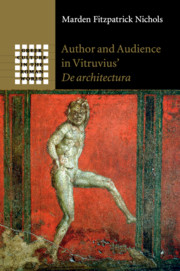Refine search
Actions for selected content:
23990 results in Ancient history

Author and Audience in Vitruvius' De architectura
-
- Published online:
- 16 November 2017
- Print publication:
- 26 October 2017
Introduction
-
-
- Book:
- The Cambridge History of Judaism
- Published online:
- 10 November 2017
- Print publication:
- 16 November 2017, pp 1-12
-
- Chapter
- Export citation
Chapter 9 - Linguistic Transformations
- from Part II - Themes and Trends in Early Modern Jewish Life
-
-
- Book:
- The Cambridge History of Judaism
- Published online:
- 10 November 2017
- Print publication:
- 16 November 2017, pp 257-273
-
- Chapter
- Export citation
Chapter 27 - Musical Dilemmas of Early Modern Jews
- from Part II - Themes and Trends in Early Modern Jewish Life
-
-
- Book:
- The Cambridge History of Judaism
- Published online:
- 10 November 2017
- Print publication:
- 16 November 2017, pp 718-734
-
- Chapter
- Export citation
Additional material
-
- Book:
- The Cambridge History of Judaism
- Published online:
- 10 November 2017
- Print publication:
- 16 November 2017, pp xiii-xvi
-
- Chapter
- Export citation
Chapter 7 - Iberia and Beyond
- from Part II - Themes and Trends in Early Modern Jewish Life
-
-
- Book:
- The Cambridge History of Judaism
- Published online:
- 10 November 2017
- Print publication:
- 16 November 2017, pp 201-225
-
- Chapter
- Export citation
Chapter 3 - The Rise of Ottoman Jewry
- from Part I - The World of Early Modern Jewry, c. 1500–1650
-
-
- Book:
- The Cambridge History of Judaism
- Published online:
- 10 November 2017
- Print publication:
- 16 November 2017, pp 77-112
-
- Chapter
- Export citation
Chapter 33 - Locals
- from Part III - The Jewish World, c. 1650–1815
-
-
- Book:
- The Cambridge History of Judaism
- Published online:
- 10 November 2017
- Print publication:
- 16 November 2017, pp 894-922
-
- Chapter
- Export citation
Part II - Themes and Trends in Early Modern Jewish Life
-
- Book:
- The Cambridge History of Judaism
- Published online:
- 10 November 2017
- Print publication:
- 16 November 2017, pp 199-734
-
- Chapter
- Export citation
Chapter 1 - The Catholic Church and the Jews
- from Part I - The World of Early Modern Jewry, c. 1500–1650
-
-
- Book:
- The Cambridge History of Judaism
- Published online:
- 10 November 2017
- Print publication:
- 16 November 2017, pp 15-49
-
- Chapter
- Export citation
Chapter 8 - The Establishment of East European Jewry
- from Part II - Themes and Trends in Early Modern Jewish Life
-
-
- Book:
- The Cambridge History of Judaism
- Published online:
- 10 November 2017
- Print publication:
- 16 November 2017, pp 226-256
-
- Chapter
- Export citation
Chapter 26 - Jews, Judaism, and the Visual Arts
- from Part II - Themes and Trends in Early Modern Jewish Life
-
-
- Book:
- The Cambridge History of Judaism
- Published online:
- 10 November 2017
- Print publication:
- 16 November 2017, pp 706-717
-
- Chapter
- Export citation
Chapter 13 - Rabbinic Culture and the Historical Development of Halakhah
- from Part II - Themes and Trends in Early Modern Jewish Life
-
-
- Book:
- The Cambridge History of Judaism
- Published online:
- 10 November 2017
- Print publication:
- 16 November 2017, pp 349-377
-
- Chapter
- Export citation
Chapter 23 - The Rise of Hasidism
- from Part II - Themes and Trends in Early Modern Jewish Life
-
-
- Book:
- The Cambridge History of Judaism
- Published online:
- 10 November 2017
- Print publication:
- 16 November 2017, pp 625-651
-
- Chapter
- Export citation
Part I - The World of Early Modern Jewry, c. 1500–1650
-
- Book:
- The Cambridge History of Judaism
- Published online:
- 10 November 2017
- Print publication:
- 16 November 2017, pp 13-198
-
- Chapter
- Export citation
Chapter 16 - Dimensions of Kabbalah from the Spanish Expulsion to the Dawn of Hasidism
- from Part II - Themes and Trends in Early Modern Jewish Life
-
-
- Book:
- The Cambridge History of Judaism
- Published online:
- 10 November 2017
- Print publication:
- 16 November 2017, pp 437-474
-
- Chapter
- Export citation
Chapter 40 - Toleration, Integration, Regeneration, and Reform
- from Part III - The Jewish World, c. 1650–1815
-
-
- Book:
- The Cambridge History of Judaism
- Published online:
- 10 November 2017
- Print publication:
- 16 November 2017, pp 1058-1088
-
- Chapter
- Export citation
Chapter 36 - The Jews in the Early Modern Caribbean and the Atlantic World
- from Part III - The Jewish World, c. 1650–1815
-
-
- Book:
- The Cambridge History of Judaism
- Published online:
- 10 November 2017
- Print publication:
- 16 November 2017, pp 972-996
-
- Chapter
- Export citation
Chapter 12 - The Christian Study of Judaism in Early Modern Europe
- from Part II - Themes and Trends in Early Modern Jewish Life
-
-
- Book:
- The Cambridge History of Judaism
- Published online:
- 10 November 2017
- Print publication:
- 16 November 2017, pp 316-348
-
- Chapter
- Export citation
Chapter 2 - Judaism and Protestantism
- from Part I - The World of Early Modern Jewry, c. 1500–1650
-
-
- Book:
- The Cambridge History of Judaism
- Published online:
- 10 November 2017
- Print publication:
- 16 November 2017, pp 50-76
-
- Chapter
- Export citation
